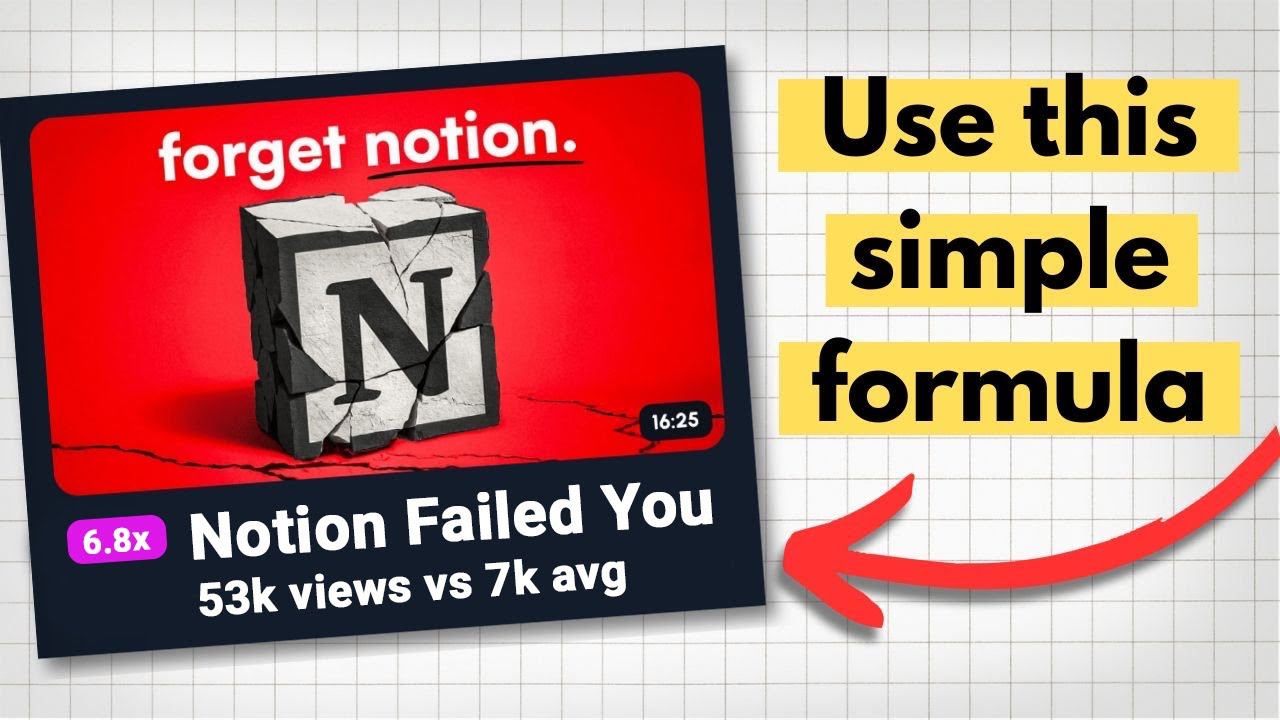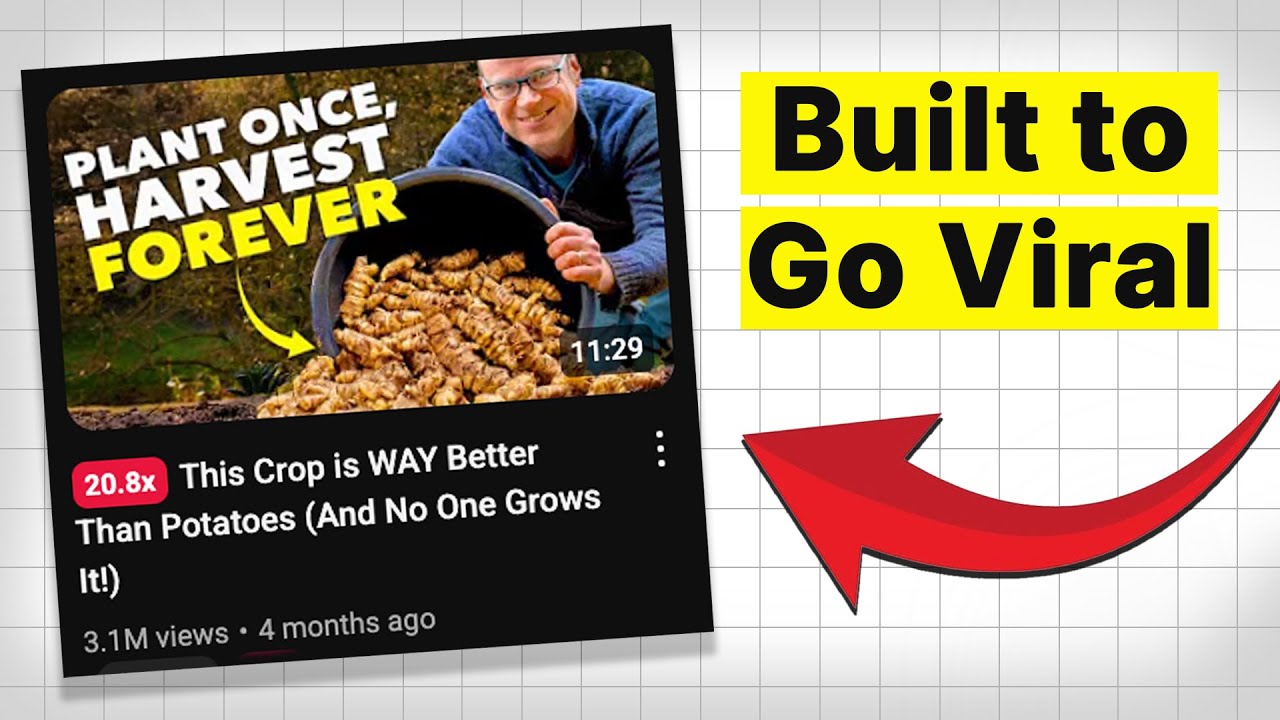Your Scriptwriting Partner
Learn to write more engaging YouTube scripts in under 2 minutes every Friday.



.webp)
After implementing this, our end screen click rate went from ~3% in our videos up to 15%+ for some videos.

Jay Clouse
@jayclouse
5.5m+ Views
110k+ Subcribers

Ali Abdaal
@aliabdaal
450m+ Views
5.9m+ Subcribers
One of the biggest obstacles to improving as a creator is not knowing what you're doing wrong and working with George provided the clarity we needed to identify these areas.

Abi Connick
@abiconnick
27m+ Views
389k+ Subcribers

Ed Lawrence
@Ed_FilmBooth
26m+ Views
375k+ Subcribers
He’s great at scripting YouTube content, and during the time we spent working together we created several videos that hit multiple millions of views.

Mike Shake
@mikeshake
764m+ Views
4m+ Subcribers

ConvertKit
@ConvertKit
20m+ Views
36k+ Subcribers
After implementing this, our end screen click rate went from ~3% in our videos up to 15%+ for some videos.

Jay Clouse
@jayclouse
5.5m+ Views
110k+ Subcribers

Ali Abdaal
@aliabdaal
450m+ Views
5.9m+ Subcribers
One of the biggest obstacles to improving as a creator is not knowing what you're doing wrong and working with George provided the clarity we needed to identify these areas.

Abi Connick
@abiconnick
27m+ Views
389k+ Subcribers

Ed Lawrence
@Ed_FilmBooth
26m+ Views
375k+ Subcribers
He’s great at scripting YouTube content, and during the time we spent working together we created several videos that hit multiple millions of views.

Mike Shake
@mikeshake
764m+ Views
4m+ Subcribers

ConvertKit
@ConvertKit
20m+ Views
36k+ Subcribers
Featured In


Trusted by some of the world's biggest creators















"Write On Time" Newsletter
Join 5,000+ scriptwriting nerds reading “Write On Time”.
Insights from writing for multi-million subscriber YouTubers sent to your inbox every Friday
The YouTube Scriptwriting Playbook
Get more views and scale your channel faster with a repeatable scriptwriting system.
Start with a half-formed video idea. Leave with a retention optimized script that's ready to record.
.svg)
Work With Me
Work directly with me through 1-1 coaching, script reviews and retention analysis.
Understand how to turn scriptwriting into your most valuable asset - so your viewers become loyal fans who click, comment and convert.

ScriptKit
Get the exact tools I use to run my 6-figure YouTube scriptwriting business.
These tools help me create better YouTube videos for clients, reach thousands through written content, and run a $100k+ per year business.
FREE Resources for YouTubers
Trusted by 5000+ creators.
I'm giving away the templates I developed while writing for Ali Abdaal, Mike Shake, and many more. Scripts written on these templates have gained millions of views.
The Retention Hub
80+ retention graph reviews. 40+ niches. All in a single database.
Filter by niche, views, retention problem (etc), to find advice that applies directly to your content.
Write On Time

The most important scriptwriting strategy in 2026
The most important “strategy” your YouTube channel needs this year is stupidly simple.
And you don’t need to:
- Dig through your YouTube Studio analytics.
- Spend hours brainstorming
- Or “study the top 1%, bro.”
It's as easy as this:
Make it extremely obvious who your videos are for, every single time.
And the #1 place people fail at this? The hook.
Here’s a recent Matt Gray hook that does not make it clear who the target audience is:
What if I told you that ChatGPT can 10x your output with four simple systems?
Sam Altman, the CEO of OpenAI, said the first billion-dollar solo business is coming, and it's going to be powered by AI.
We're living through the David versus Goliath moment of our generation, where one person with AI can do far more than 50, 100, or even 500 people.
So today, I want to show you four ChatGPT systems that you can go and leverage to make real money in the new era of AI. Let's get into it.
The problem? This video is aimed at helping businesses make more money with AI.
Sure, he mentions “business” once.
But the parts in red sound either extremely vague (”10x your output”) or aimed at individuals who want to make more money (”systems you can go and leverage to make real money”).
To show you how to fix a hook like this, I re-wrote it.
But a quick announcement first...
14/20 TICKETS SOLD
Join me in London for an in-person YouTube strategy day!

We’re running an intensive, one-day event for entrepreneurial YouTubers to help you nail the 3 core aspects of a successful YouTube channel:
- Strategy & Packaging (hosted by Jamie Whiffen)
- Scriptwriting & Retention (hosted by me!)
- Systems & Production (hosted by Gwilym Sims-Williams)
My co-hosts, Jamie and Gwilym, have generated millions of views working with channels like Bryan Johnson, Gordon Ramsay, and Ramit Sethi... to name just a few.
Our goal?
To help you make more strategic YouTube progress in one day than you would in 6 months.
To learn more about the event and claim your spot, click here:
We're grateful to our event sponsor:
Justin Moore: Author of Sponsor Magnet
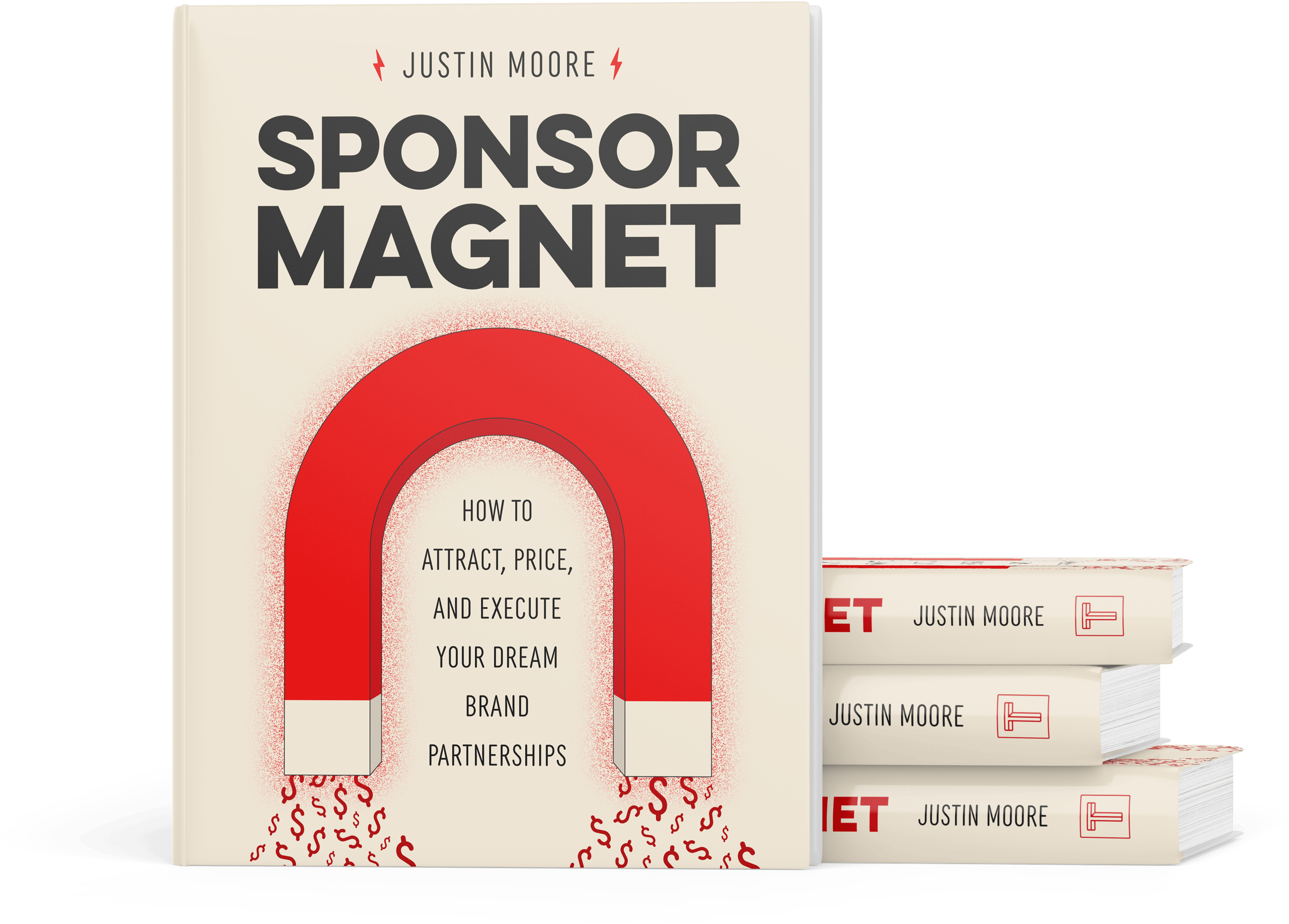
Ok, back to the business-focused re-write:
What if I told you that ChatGPT can 5x your business’s revenue with four simple systems?
Sam Altman, the CEO of OpenAI, said the first billion-dollar solo business is coming, and it's going to be powered by AI.
We're living through the David versus Goliath moment of our generation, where even a one-person business with AI can do far more than teams of 50, 100, or even 500 people.
So today, I want to show you four ChatGPT systems that you can leverage to increase both your business’s efficiency and its bottom line profitability. Let's get into it.
Small changes, but it’s now crystal clear who the video is for.
So this year, before you publish any video, check that you’ve made it extremely obvious who it’s meant for.
And, if you want direct feedback on your scripts from me this year, you can join the YouTube Writers' Room.
That's all for this week.
Any questions? You can to reply to this email and I'll get back to you.
Speak soon,
George 👋
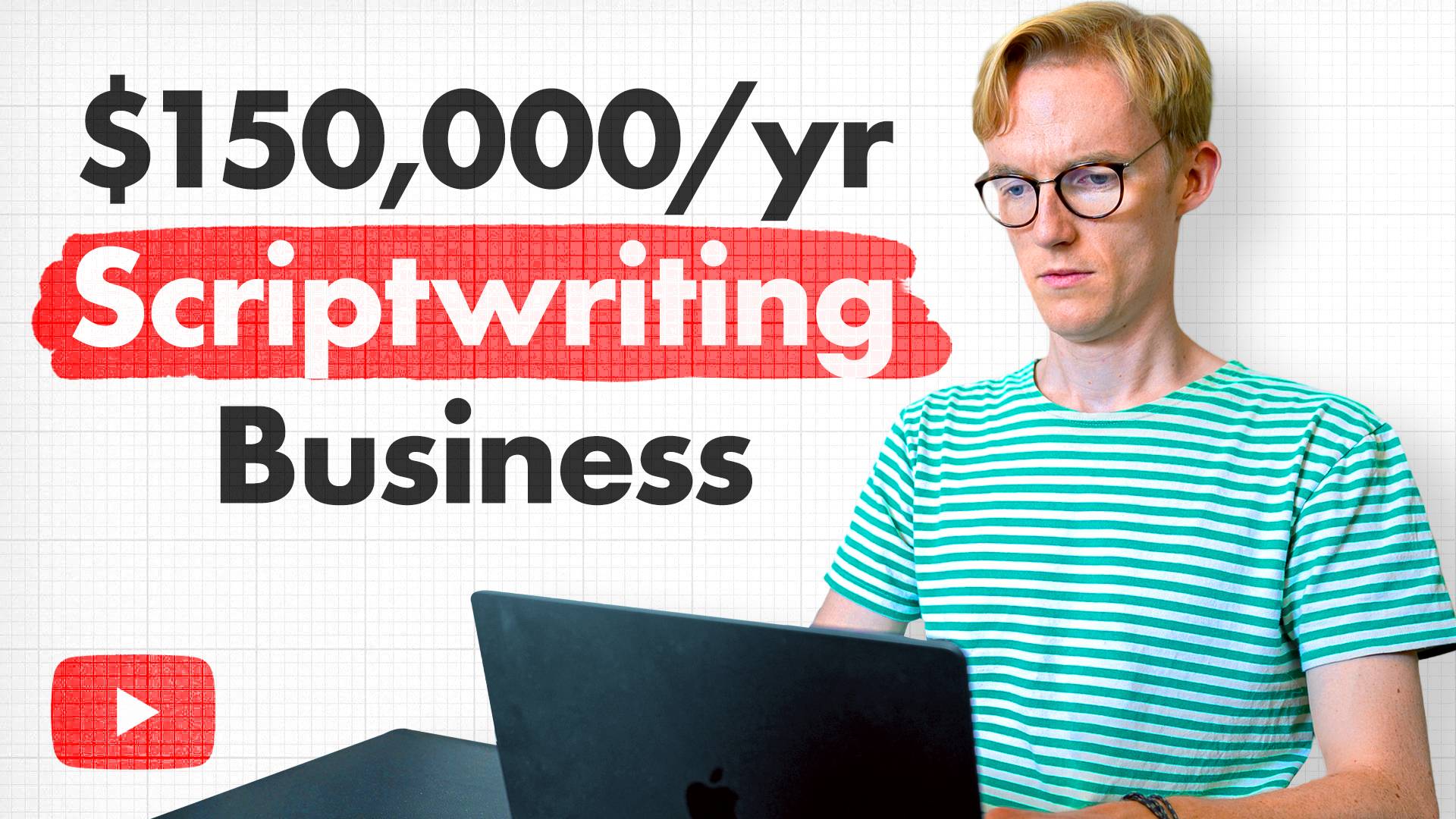
4 years of YouTube scriptwriting in 26 minutes
How's your year been?
Have things gone as you planned? Or better?! Or... worse? 😬
After all, it's the ideal time of year for a bit of R&R - reviewing and reminiscing 🤓
And in that spirit, I decided to review not just this year... but the last four.
All the way back to the very start of my career as a YouTube scriptwriter.
Because the way I write YouTube scripts - and my entire business model - have changed a lot in that time.
So, to save you the four year learning curve, here's how my approach to scriptwriting has changed since 2021...
Watch it as a video...
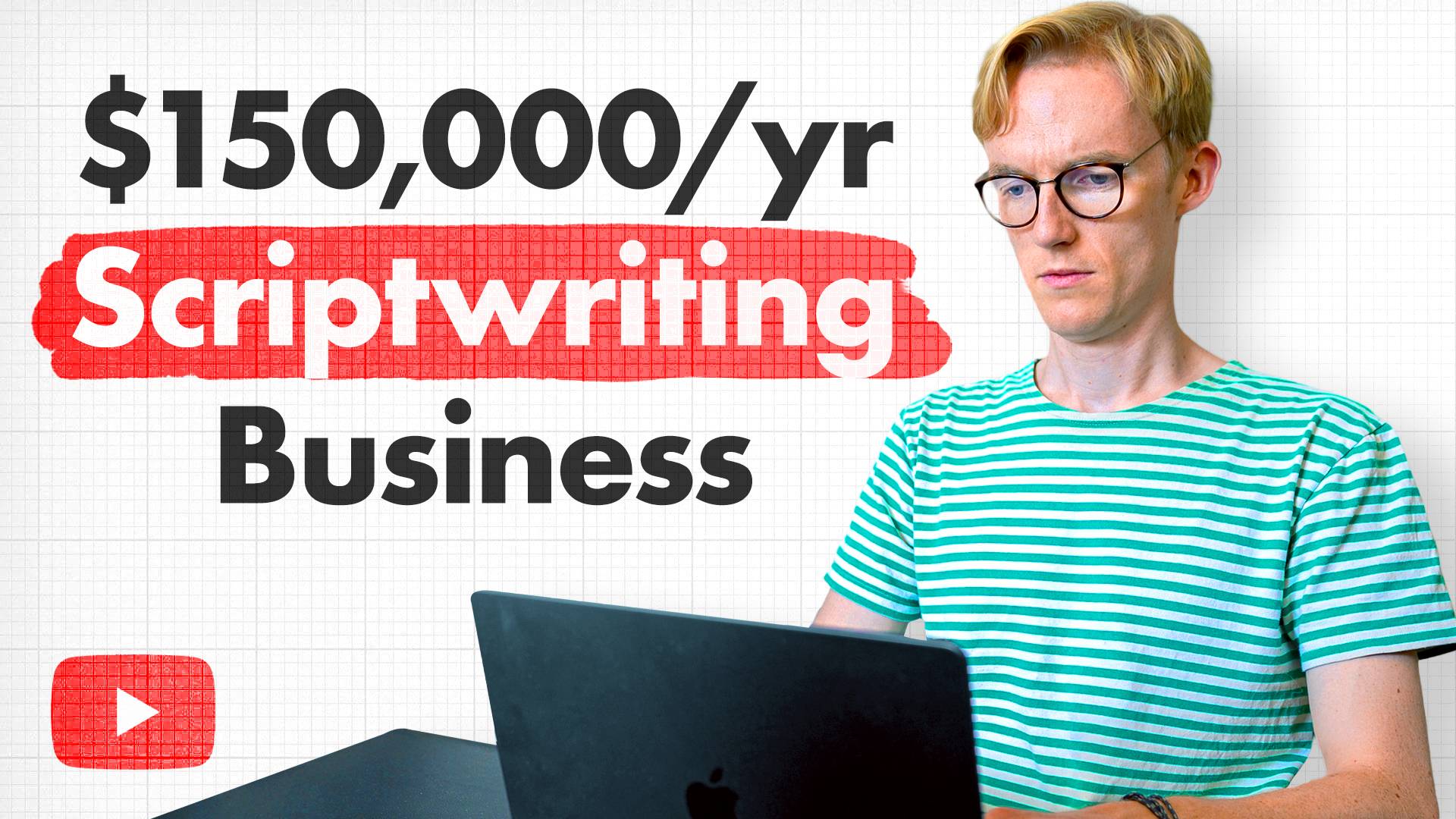
Watch Here
Or, if you prefer to read the highlights + takeaways, I've extracted these below, broken down by the different "eras" of my business...
Full-Time Scriptwriter for Ali Abdaal:
The truth is, I learned close-to-nothing about scripting for YouTube while working with Ali.
There was no training, our systems changed constantly, most video ideas were scrapped - and the result was that I never got to study what had and hadn’t worked with my scripts.
Ergo, every new script felt like I was back to square one, blindly writing in the dark.
This is not the way to become a good writer for YouTube.
Takeaway:
- Spend time reviewing your videos post-publish, otherwise you’ll never learn what’s working, or what’s holding you back.
Freelance Writer; various clients:
Getting to write for multiple channels at the same time was eye-opening.
This not only exposed me to new niches, but new formats as well.
Plus, unlike working full-time where there had been a long feedback loop between videos, now I was writing 1-2 scripts per week, every week.
Takeaway:
- Try different formats for your videos to expand your scriptwriting skills - from listicles, to detailed explainers, to more story-driven content like the video I linked above.
- Write consistently. We run weekly group scriptwriting sessions in the YouTube Writer’s Room for this reason.
Started building an audience:
While working freelance, I began writing this newsletter.
At first, I had no strategy. But I promised myself I’d write something every week.
Eventually - more through statistical probability than strategy - I hit on a topic that really resonated: reviewing retention graphs.
For the next 6 months, every single issue of this newsletter was devoted to reviewing 3 retention graphs my readers had sent in.
Not only did this help me grow my own audience, but it rapidly accelerated my understanding of scriptwriting and retention.
Takeaway:
- As above, write consistently. You only need one idea to pop off, and your channel’s trajectory may change significantly. It happens with YouTubers all the time, and it happened with my newsletter. Keep placing bets.
- Study your own retention graphs, and look for patterns that arise across multiple videos. Diagnose; test; repeat.
Started building frameworks:
“The retention stuff is cool. But I think people want to see more of George.”
This is what Dodford said to me at a London meetup in mid-2023.
The truth is: I had become so entrenched in the retention graph “thing”, I’d become too scared to write about anything else.
But he was right. And I was getting bored. So I started to write newsletters much more like this one.
Not only was this creatively liberating, but I started to explore the connections between the patterns I’d noticed in all those graphs.
Suddenly, I was creating frameworks for scriptwriting - repeatable structures I could lean on every time.
Takeaway:
- Whether you use mine, someone else’s, or create your own - use frameworks for scriptwriting. It’s what I wish I’d had when I worked for Ali.
Launched my complete scriptwriting system:
After 6 months of work, I codified and combined my scriptwriting frameworks into a complete system.
Originally launched as “The YouTube Scriptwriter’s Playbook” (now renamed “The YouTube Scriptwriting Playbook”), this system allowed me to follow the exact same steps every single time I wrote a script.
No second-guessing. No overthinking.
This was everything I had wished I’d had for the previous two years.
(And, of course, you can join the 600+ students who have learned the system here.)
Takeaway:
- Whether you use mine, someone else’s, or create your own - combine scriptwriting frameworks into a repeatable system. This takes 90% of the guesswork out of every script, and allows you to focus on creativity.
Grew my scriptwriting community:
Last minute, I decided to add a scriptwriting "community" upsell to my course.
Now, not only could students learn my system, they could also get direct feedback from me (and each other) on how to implement it properly.
I won't bang on about it, but after two years running the community, I finally kicked the imposter syndrome on this one - I think it's a truly valuable place to be if you want to write better YouTube scripts.
(If you're interested, you can join the YouTube Writer's Room here.)
Takeaway:
- Whether it's in my community or elsewhere: get feedback from trusted peers on your scripts. You'll learn your blind spots way faster.
Had an identity crisis!
Lol. Let me try and explain why.
In January 2024, I had launched:
- My course.
- My community.
- An agency (for some reason).
This led to me making over $100k between January-March, which was the kind of money I might previously have made in 2-3 years.
But, in March, I also closed my agency because I hated running it.
The net result was that all the big projects I’d been working on for months were either launched or in the bin.
Plus, making good money quickly came with some truly unexpected feelings of guilt and even something like apathy.
- I no longer had a “North Star”, or any specific goals.
- I was making more money the less I actually wrote YouTube scripts for clients (imposter syndrome central).
- I no longer felt like an “underdog” - a feeling that that had spurred me on in 2022-23.
At the exact moment things were better than ever, I felt completely lost.
Ok, that got heavy, but there is a…
Takeaway:
- Prepare for crazy mental swings as a YouTuber. You might have a video go viral, then struggle to get decent views for the next 3 months. So...
- Think in "longer time horizons". Acknowledge that every flop (and every win) is just another data point across a long time period. Hashtag YouTube is a hashtag marathon not a hashtag sprint.
So... 2025.
These days, things have smoothed out a bit.
A lot of my biggest business worries were calmed after time being coached by a lovely guy called Craig Shoemaker.
Ergo, I've finally landed on a cadence of work that I mostly enjoy, and that feels valuable to my clients and students.
In 2025, my time is divided between:
- Lower-contact client work (1-1 calls + script reviews).
- Running my awesome scriptwriting community.
- Writing scripts for my own channel.
Financially, I had a poor Q1 and Q2… but a much better Q3 and Q4.
Looking back over the last four years has helped me see the many mistakes I’ve made - both as a writer, and a business owner.
But it’s also given me renewed appreciation for you.
When I wrote my first newsletter on July 15th 2022, I had no idea where it would take me.
So the fact that I’m able to have these little interactions with you every week, three and a half years later, means a great deal.
With that said, I’m looking forward to writing to you again in 2026.
Let’s see where we all end up this time next year!
That's all for this week.
Any questions? You can to reply to this email and I'll get back to you.
Speak soon,
George 👋
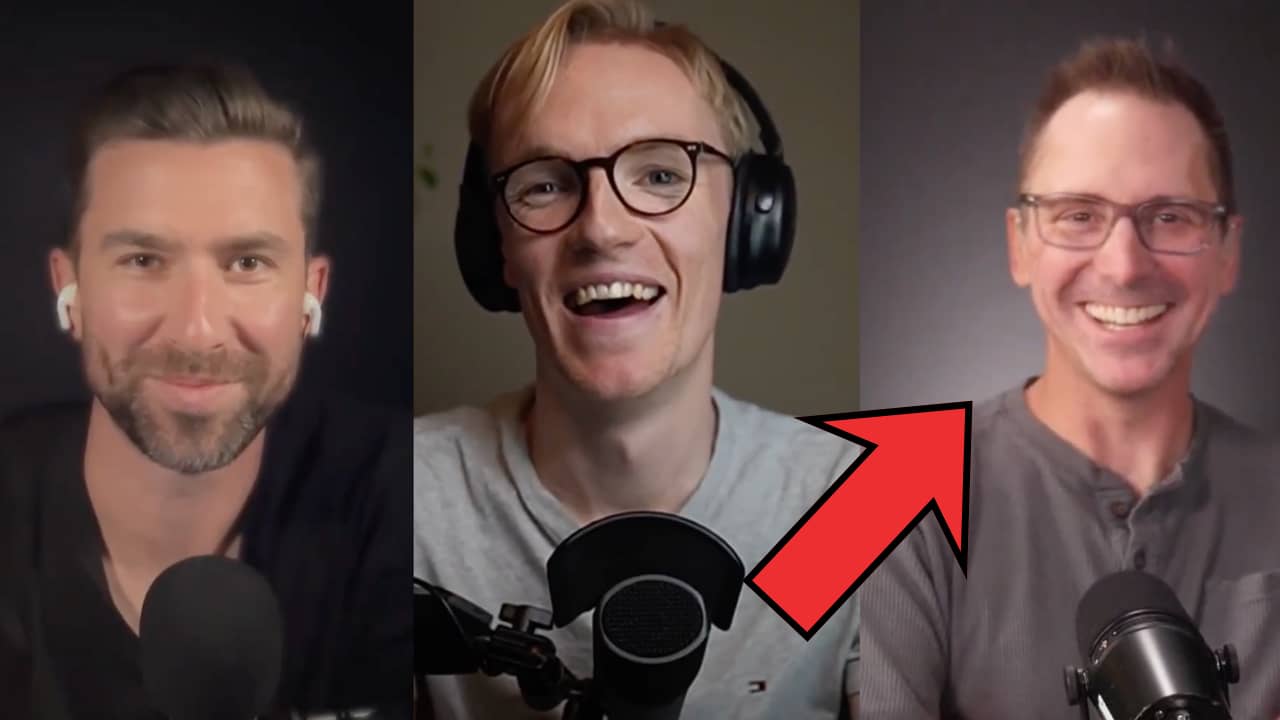
How I fixed a $4000 hole in my YouTube business
Last week, I shared a podcast I had appeared on where my scriptwriting business got... kinda roasted 😆
This week, I want to share what I’ve been doing behind the scenes to fix the problems and make YouTube a more effective funnel for my products and services, so you can do the same.
We’ll start with the advice my business coach gave me that’s already added thousands of dollars to my revenue...
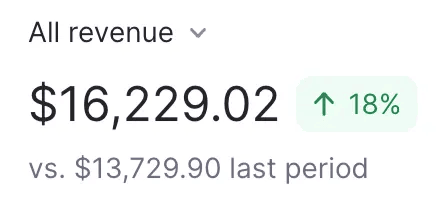
...and we'll finish with the different ways I’ve been deploying call-to-actions in my scripts - so you can steal them.
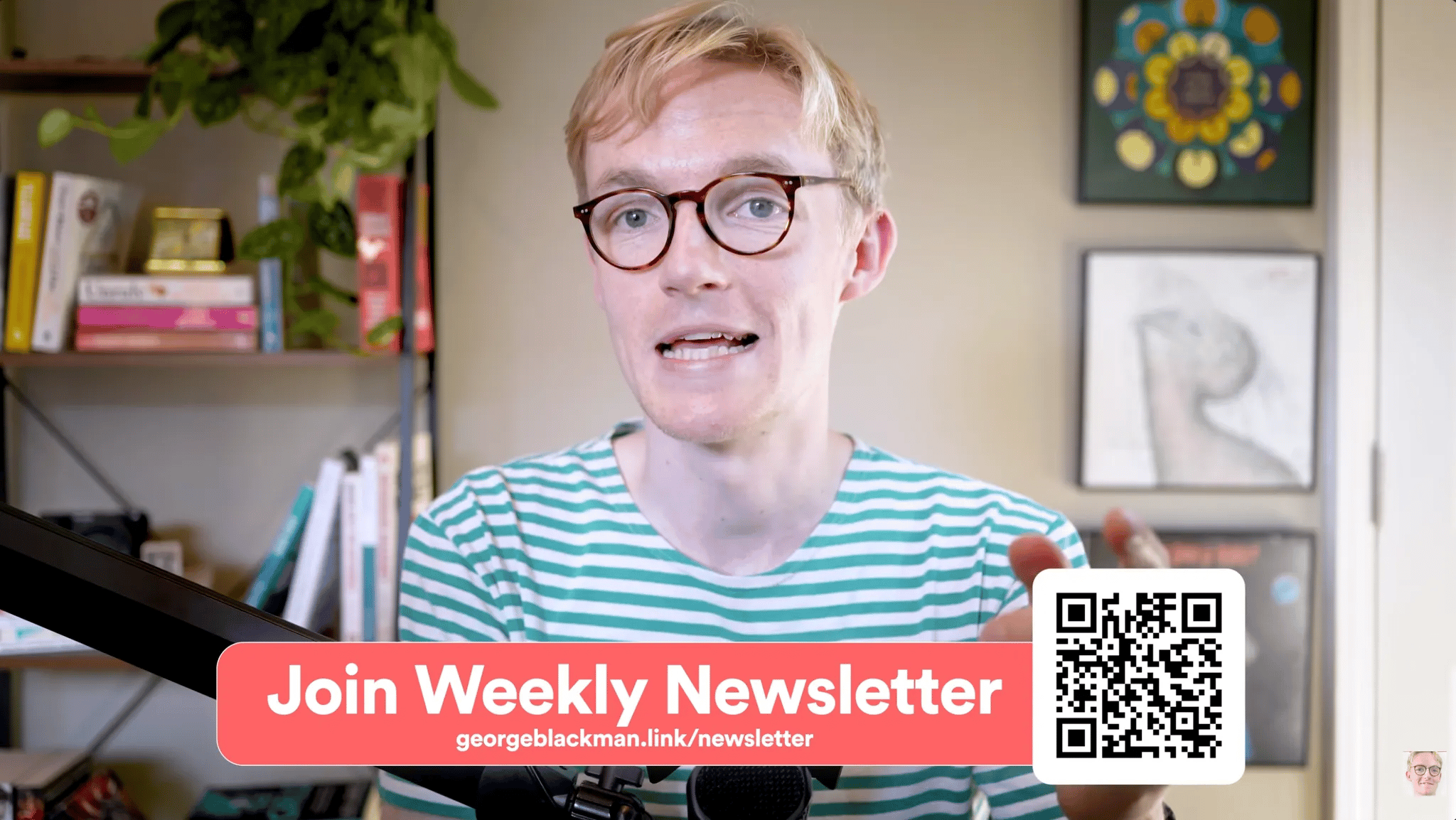
The $4000 hole in my business (now fixed!)
Before I go any further, I want to shout out my business coach, Craig Shoemaker, for helping me see this HUGE missed revenue opportunity.
(He was one of the guys who roasted me on that podcast... 😆
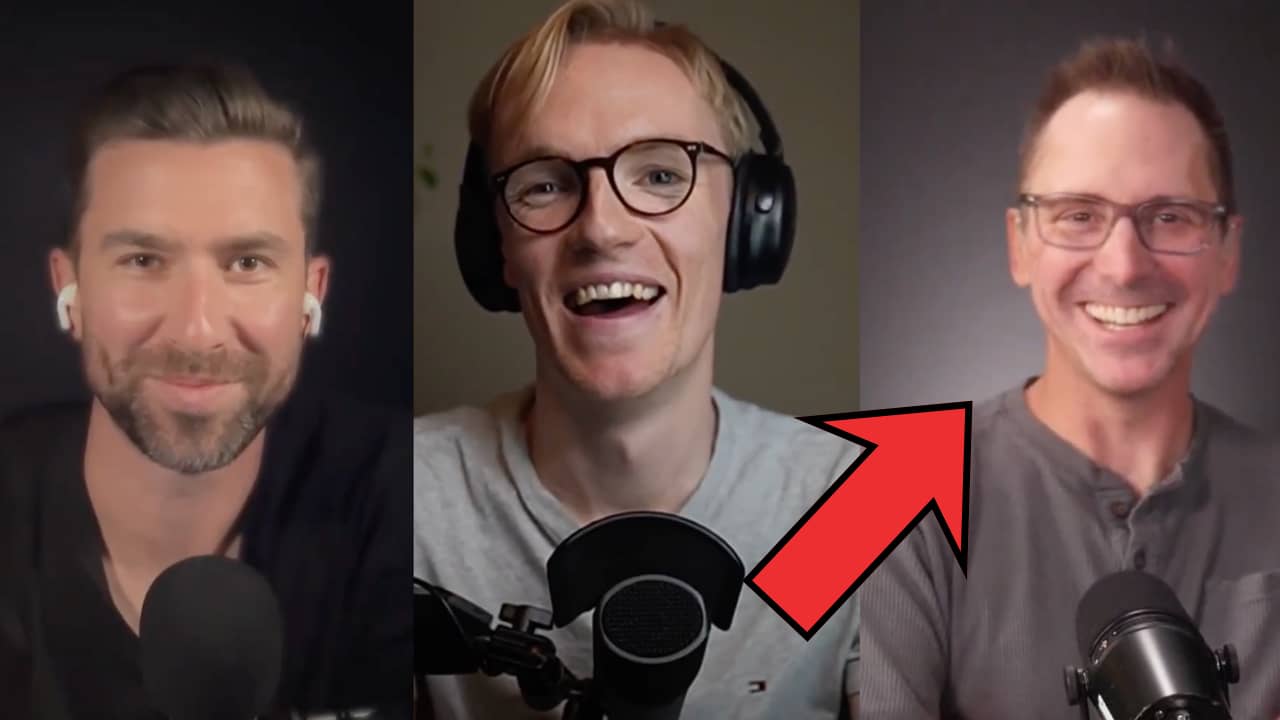
...and he's got a unique offer made just for you that's gonna help you increase your profits without getting more views on YouTube.
Learn more!
Anyway, on Craig’s suggestion, I started using my low-ticket product (the AI Scriptwriting Toolbox) as an upsell for my course (the YouTube Scriptwriting Playbook).
I had always been so focused on making more products that I'd never stopped to think about how my existing products could be working harder for my business.
So I paired the two products together, as Craig suggested.
(And, safe to say, it’s been pretty game-changing.)
Since doing so, average order value for the AI Scriptwriting Toolbox has increased by 56%…
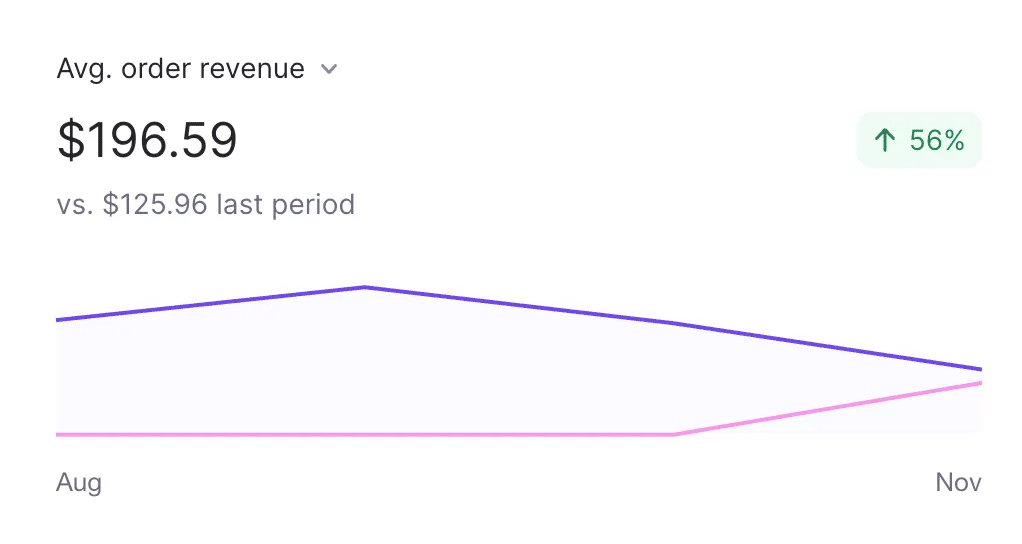
…generating an additional $1400 in revenue.
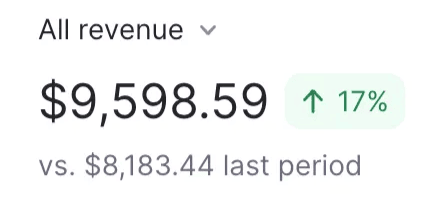
Meanwhile, average order value for the YouTube Scriptwriting Playbook has increased by 25%…
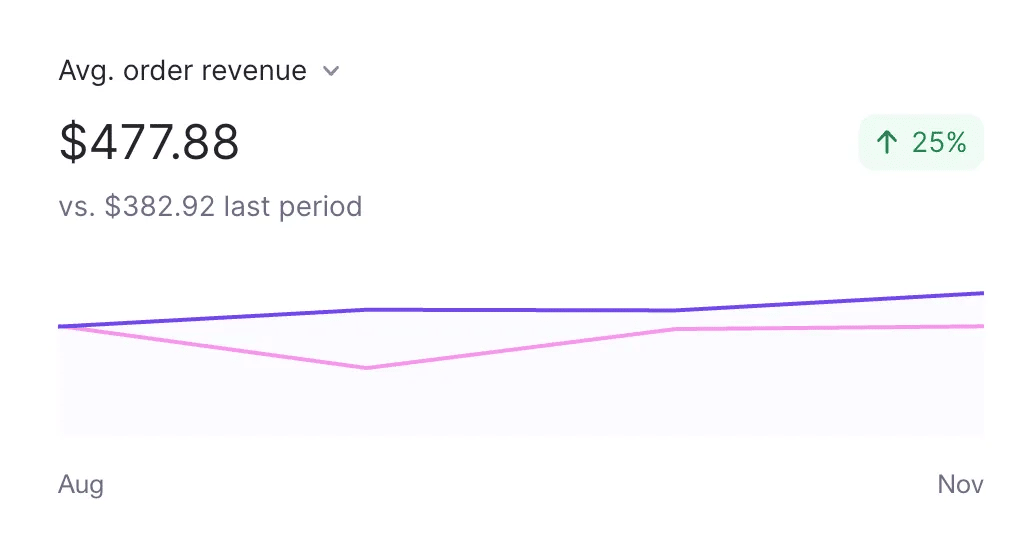
…generating an additional $2500 in revenue.

That’s $3900 additional revenue for doing… nothing.
Nothing except reminding high-intent buyers that my other products exist.
Extrapolated across the whole year, that's approximately $16,000 in additional revenue I could expect my business to generate.
But the cash is one part of it. The mindset shifts have made an even bigger impact.
- I had stopped consulting because I found it too stressful. Craig helped me re-frame my relationship with it. Now, not only do I actually enjoy it, but I've made $20,000+ in the last six months from it.
- I had no idea what my customers actually wanted from me. But after Craig convinced me to actually speak to existing customers, and my marketing copy completely changed.
- I worried that I wasn't delivering enough value for my community students. But Craig totally re-framed my thinking. So I increased the price 50%... and people are still buying.
And now? Craig is sharing his expertise with you...
Increase your YouTube-driven profits without having to chase new customers.
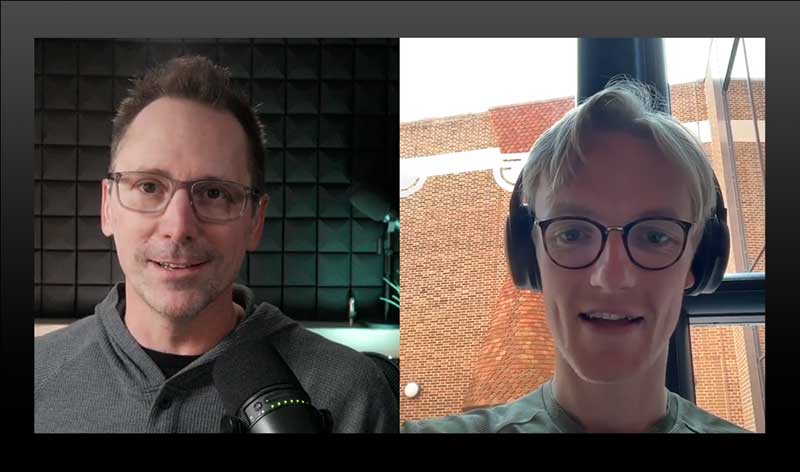
Craig has put together a comprehensive, FREE resource pack, designed specifically for my newsletter readers.
After all the work we did together, I'm incredibly excited to share this! If you sign up, you'll receive:
- Introductory mini-course covering the 5 key areas your business could be creating bigger profits.
- Follow-up email course over the next 27-days, diving into more detail about how to execute these low-lift strategies.
- $1000 discount on coaching, should you ever decide to work more closely with Craig.
Sound good? (Spoiler alert: it does sound good 😆)
I want these free resources!
Now that I’ve started plugging these gaps in my business, I can focus on executing my in-video CTAs to increase traffic.
So, here’s how I’ve been doing this in my scripts, so you can do the same...
Steal these 4 CTAs for your next script.
If you’re using YouTube to promote anything, whether it’s a high-ticket flagship product or a free lead magnet, there are different ways we can try to convince our audience to “click our thing”.
If you need inspiration, steal these 4 approaches I’ve tried over the last few weeks:
1/ Don’t mention it at all.
One video focused on my unique approach to scriptwriting structure, and the lead magnet was a template viewers could download to help them write the same way.
I never mention it in the script. I simply put it as the first link in the description AND in a pinned comment.

Surprisingly, this has been my highest clicked + highest converting lead magnet!
2/ Proof in the pudding approach.
Here, I’m literally using one of my custom GPTs to write the next few lines of the script I was midway through recording.
I rely on the demonstration being good enough to convince them to buy, and leave a handy QR code on-screen.
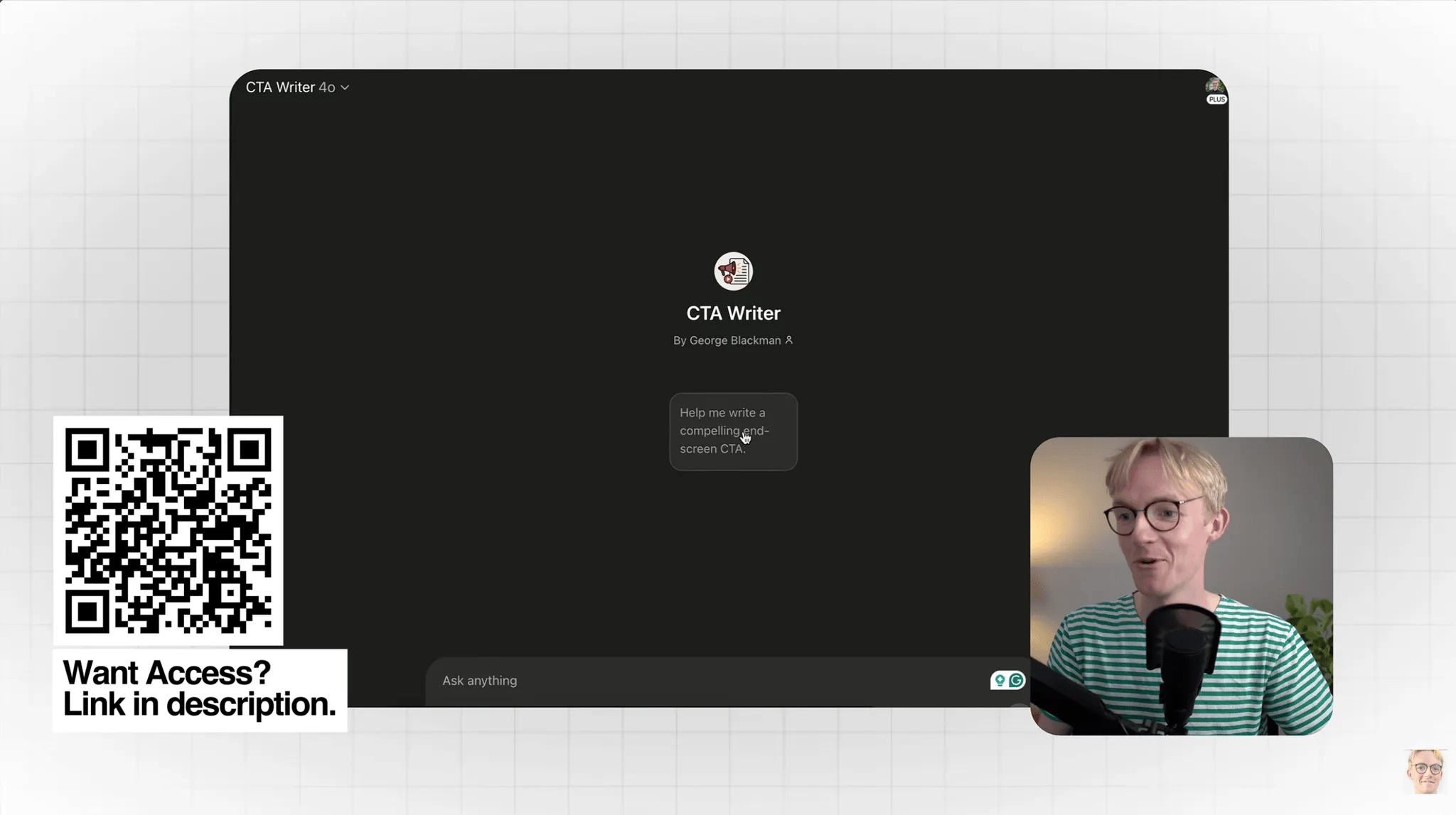
3/ “Wanna make this easier?”
After teaching a scriptwriting principle, I casually mention that the viewer can speed up implementation with a free custom GPT.
No hard sell… just a no-strings attached offer to make their life easier!
(Ok… the string is that I get their email address.)
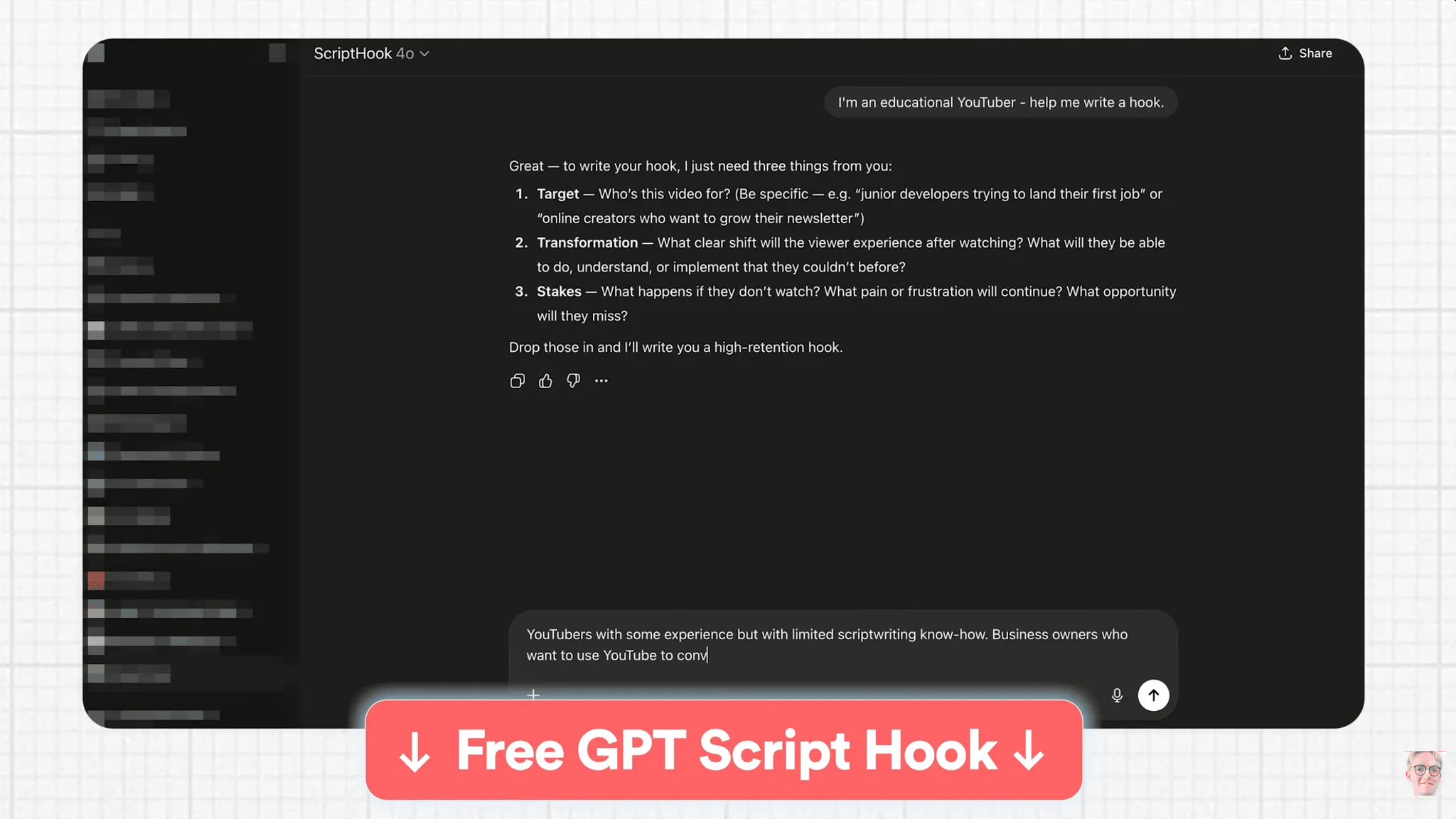
4/ “Want EARLY ACCESS to these tactics?”
Here, I pause to explain that the video they’re watching right now started its life as a newsletter article.
This is pulling on the same psychological strings you see when YouTubers upload their content to something like Patreon 24 hours earlier than YouTube.
The idea is: if they want early access to my tactics, they can simply sign up for my free newsletter.
We want to create the idea that the viewer can become part of an “inner circle”.
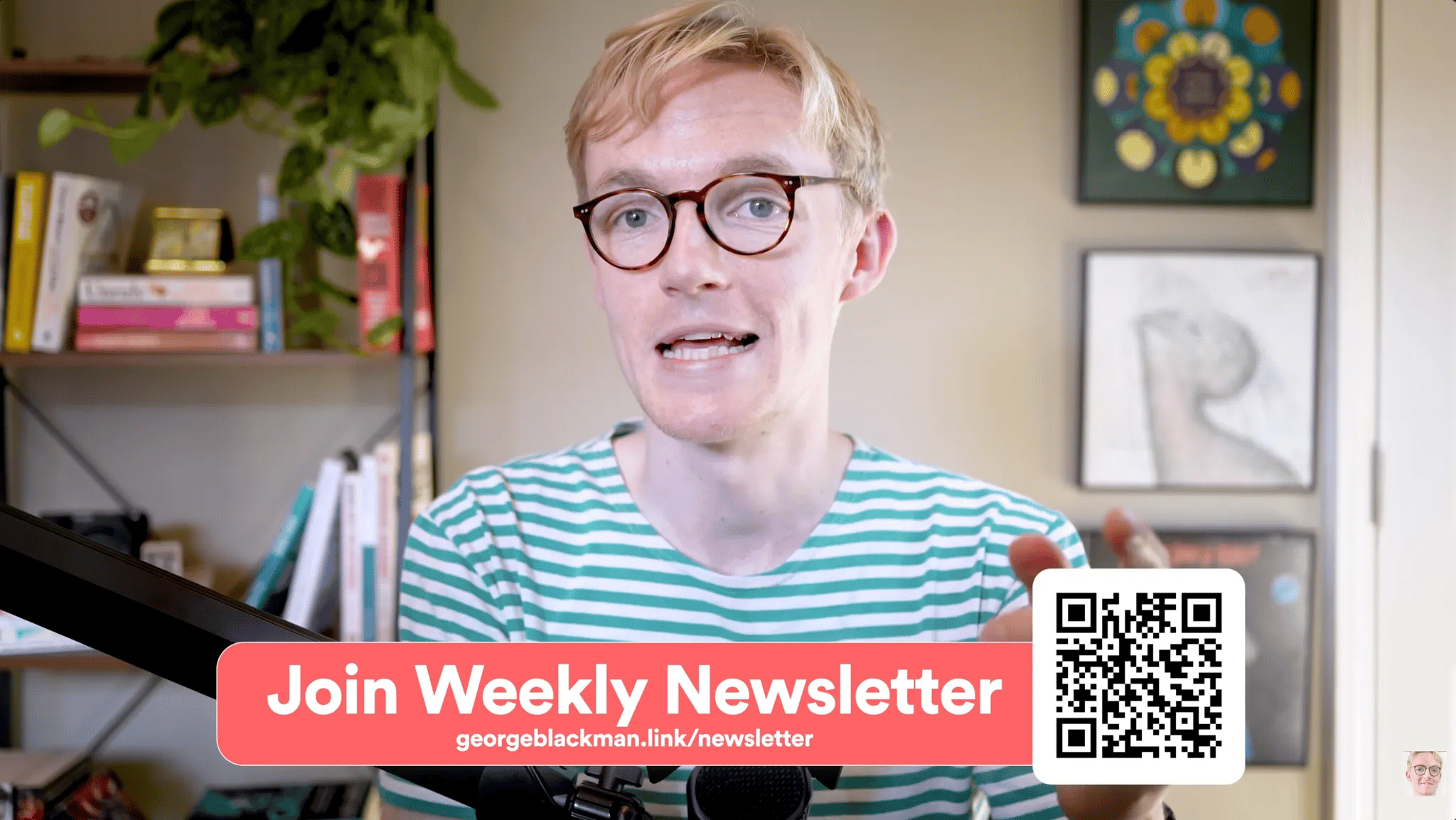
That's all for this week.
Any questions? You can to reply to this email and I'll get back to you.
Speak soon,
George 👋
Trusted by creators in a bunch of niches







I've written for 10+ channels, advised on content from 40+ niches, and consulted with 10,000,000+ subscriber creators.
People have said nice things!

Ali Abdaal
@aliabdaal
400m+ Views
5m+ Subcribers

Justin Moore
@creatorwizard
470k+ Views
46k+ Subcribers

Abi Connick
@abiconnick
21m+ Views
322k+ Subcribers

Jake Thomas
@creatorhooks
6m+ Views
40k+ Subcribers

Mike Shake
@mikeshake
650m+ Views
3.3m+ Subcribers

Creator Booth
@creatorbooth
1m+ Views
34k+ Subcribers
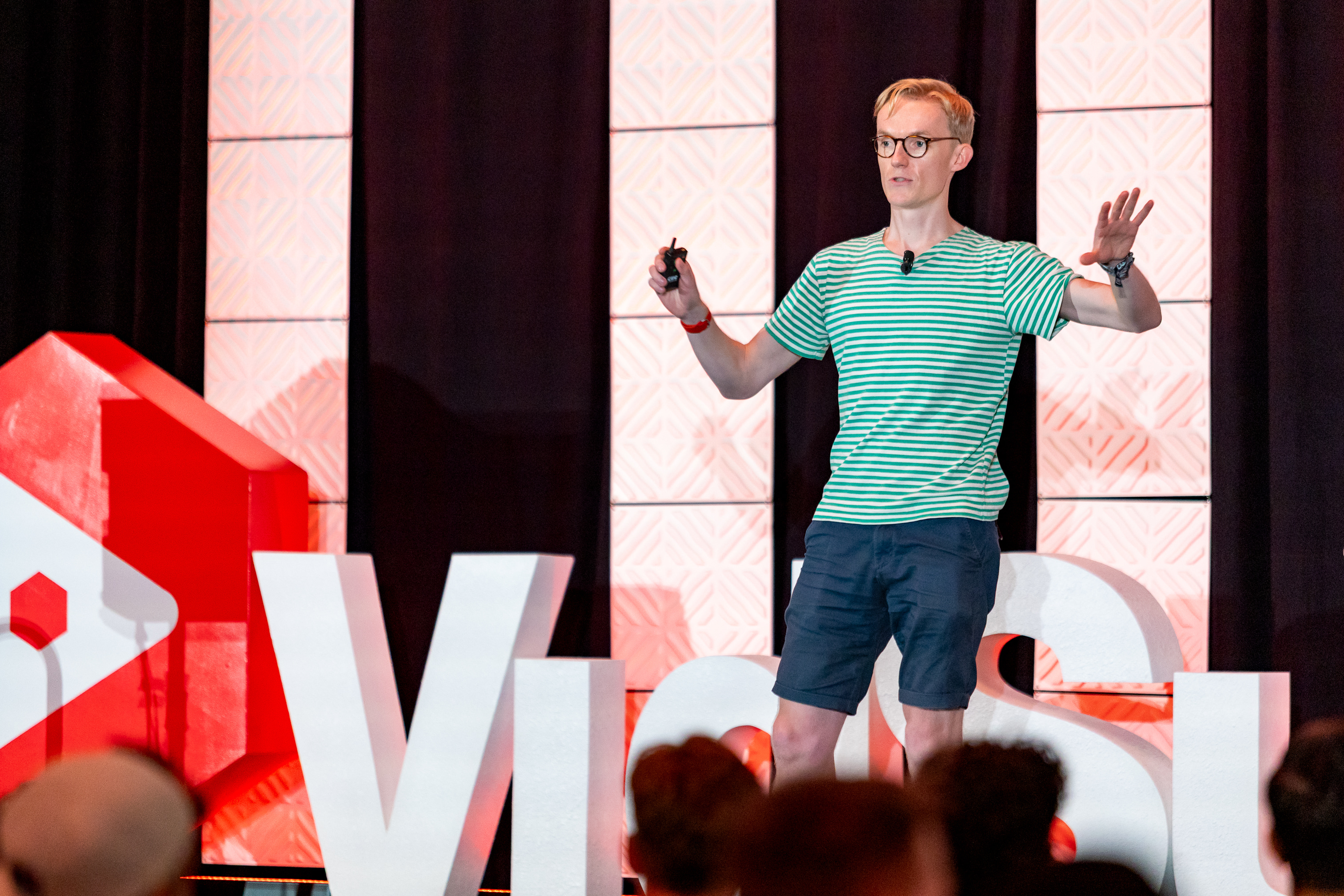
Hey, I’m George 👋
I started as a full-time scriptwriter for Ali Abdaal, and have since worked with creators between 30,000 subscribers, all the way up to 10,000,000+.
I'm on a mission to educate both YouTubers and writers about the impact scriptwriting can have on a channel.
Whether your goal is to increase retention, grow a loyal audience, boost AVD, skyrocket end-screen CTR, or simply make the process of making a video less stressful…
...I'm here to help you do that through smartly scripted YouTube videos.
+
k+
m+
Latest Podcast Episodes
Create more engaging videos with simple, actionable scriptwriting tips.
Join 5,000+ scriptwriting nerds reading “Write On Time”. Insights from writing for multi-million subscriber YouTubers sent to your inbox every Friday.

.png)
.png)

.jpg)




